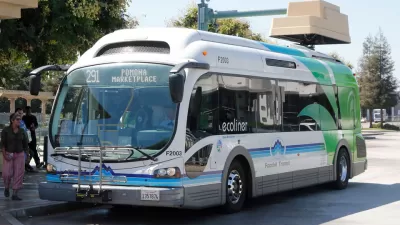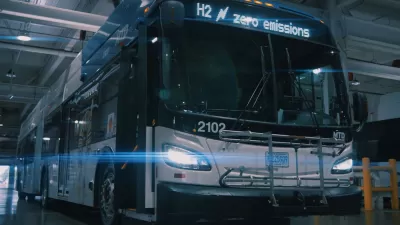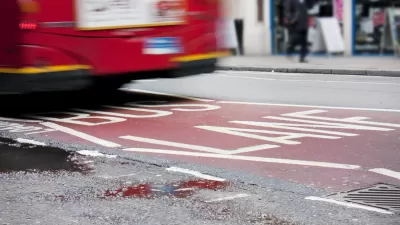To switch to fully electric bus fleets, transit agencies can invest in batteries and hydrogen fuel cells. Both have their advantages.

As more cities seek to minimize their use of fossil fuels, bus fleets are one obvious place to start. But should the buses of the future be powered by rechargeable battery or hydrogen fuel cell? "There isn't an obvious answer. Both are more environmentally friendly than fossil-fuel buses, and both can be cost-effective options," Daniel C. Vock writes.
Vock reports on two Illinois transit agencies that have made the switch. One of them, the Rock Island County Metropolitan Mass Transit District, went with batteries. "One concern for the agency was how the batteries would perform over the long haul. The battery technology is so new that the agency has had to rely on engineers' estimates about battery life rather than real-world testing," Vock writes. But so far, the buses have met or exceeded agency expectations.
The Champaign-Urbana Mass Transit District (MTD), by contrast, found the battery electric option lacking. Serving the students of the University of Illinois, who "expect buses to come frequently and run late into the night," MTD wanted engines that could match diesel's range. It also had qualms about recharging batteries on the power grid, which runs on coal in Champaign-Urbana. Currently, MTD plans to produce its own hydrogen.
In both cases, agencies will have to come to terms with upfront costs. Both the Rock Island County Metropolitan Mass Transit District and the Champaign-Urbana Mass Transit District defrayed some of that expense with federal grant money.
FULL STORY: Batteries or Hydrogen? Cities Weigh the Best Way for Buses to Go Electric

Planetizen Federal Action Tracker
A weekly monitor of how Trump’s orders and actions are impacting planners and planning in America.

Chicago’s Ghost Rails
Just beneath the surface of the modern city lie the remnants of its expansive early 20th-century streetcar system.

San Antonio and Austin are Fusing Into one Massive Megaregion
The region spanning the two central Texas cities is growing fast, posing challenges for local infrastructure and water supplies.

Since Zion's Shuttles Went Electric “The Smog is Gone”
Visitors to Zion National Park can enjoy the canyon via the nation’s first fully electric park shuttle system.

Trump Distributing DOT Safety Funds at 1/10 Rate of Biden
Funds for Safe Streets and other transportation safety and equity programs are being held up by administrative reviews and conflicts with the Trump administration’s priorities.

German Cities Subsidize Taxis for Women Amid Wave of Violence
Free or low-cost taxi rides can help women navigate cities more safely, but critics say the programs don't address the root causes of violence against women.
Urban Design for Planners 1: Software Tools
This six-course series explores essential urban design concepts using open source software and equips planners with the tools they need to participate fully in the urban design process.
Planning for Universal Design
Learn the tools for implementing Universal Design in planning regulations.
planning NEXT
Appalachian Highlands Housing Partners
Mpact (founded as Rail~Volution)
City of Camden Redevelopment Agency
City of Astoria
City of Portland
City of Laramie





























